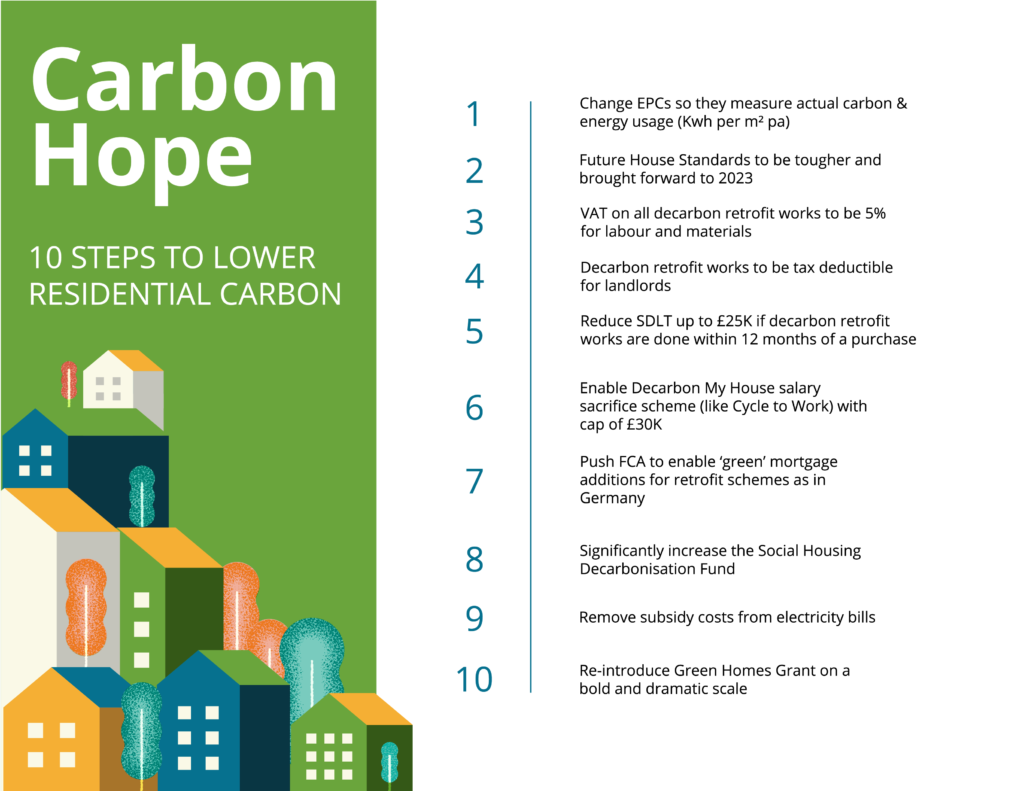In the climate crisis, there is a big bloody great elephant in the room: our homes. residential housing contributes 20% of the UK’s CO2e, yet what is being done to tackle it?
The carbon linked to transport, food and buying stuff is high profile and front of mind. With these issues we can make immediate choices to de-carbon our lives: use a bike, buy an EV, fly less, stop eating beef, buy less plastic packaging, etc.
So why is residential carbon being ignored? Here are five reasons:
- This is a stonking great problem. The Climate Change Committee (CCC) says 19m UK homes need some form of de-carbon retrofit. Eight million of these homes have solid brick walls, making them expensive to insulate. The industry dances around new build standards (see below), but the already-built homes are the issue: 80% of the homes which will exist in the UK by 2050 are already built. In one study, Leeds City Council estimated an average of £24K cost per retrofit with one heat pump. That’s £456 billion.
One paradox: gas is cheap (artificially so, as the subsidy costs are loaded onto electricity bills, not gas), yet 10.3% of UK households are in ‘fuel poverty’. Cheap gas is a wicked barrier to change as lower-carbon heating tends to use electricity, so post-retrofit your bills may be the same! Fuel poverty is like the NHS: a political minefield. No politician is going to increase gas bills.
- For consumers, it is a pernicious mixture of expensive, confusing, intimidating and boring. Justunder 19m homes are owner-occupied, yet estimates are that only 1m homeowners are seen as early adopters who will voluntarily retrofit and upgrade their own homes. For context, 11,000 heat pumps were installed in 2019 against 1.7m gas boilers.
The barriers are obvious. Remedial measures such as heat pumps and external insulation are seen as expensive and there is no real payback. Also, there is ambiguity around what the right retrofit solutions are and the debate can be confusing, eg, hydrogen replacing gas, the idea of hiring and managing builders is intimidating for many and ultimately this is not a sexy area – at least buying an electric car is a novelty. Any retrofit project will soak up cash and, at best, your home might be slightly warmer and less draughty.
- The current goalposts and rules are probably wrong. The Government has doubled down on EPCs as the mechanism to measure progress. EPCs are digestible with their A to G ratings, yet they are flawed as they do not measure energy usage or carbon usage. An EPC is a theoretical guess, not actual data. The House of Commons Environmental Audit Committee wants them replaced so that the new EPC would have “energy and carbon metrics in its headline rating.” Does the Civil Service have the motivation to change/replace EPCs?
- Free market forces will 100% not cut it. Behaviour change needs incentives, yet beyond ‘climate guilt’ (which is arguably a middle-class luxury) there are, as per point 3 above, few incentives to retrofit. It gets worse with private landlords. The rental sector is 20% of UK homes, yet energy improvements are not tax deductible and those paying (landlords) do not benefit from the retrofit (called the ‘split incentive’).
It appears that the only motivated sector are the local authority/social housing providers who own 15% of UK households. They care about their carbon footprint and they already take a long-term property custodian view. If the free market will not solve the problem, we need Government intervention.
- Are the Government and property industry in denial? The Government just cancelled the only retrofit grant for the 19m owner occupiers – the Green Homes Grant. Commercial agents are all over climate change as they can help clients save money, but what are resi agents doing? The Letting Industry Council is lobbying to delay the proposed plan to make D and E rated rental homes illegal by 2025!
Civil servants are producing acres of words but scant policy. Hopefully these three reports will trigger action: just published, the CCC’s Sixth Carbon Budget with its headline target of a 78% reduction of the 1990 CO2 emissions by 2035; the BEIS ‘Heat and Buildings Strategy’ is (over)due and every other report references it as a quasi-keystone; the Treasury’s Net Zero Review is due in Spring 2021.
Despite the negative emotion in this analysis, this problem is fixable. Some thoughts:
- Everyone can make a difference. Trite? Naïve? Perhaps, but we need to empower people and spread a message of practical optimism. If there are 19m homes which need work, then there 30m people who can contribute. The pandemic has showed us that in times of crisis people can change behaviour and the Government can get the chequebook out. Each person, property professional and civil servant can make a difference and feel proud about it. Positivity must persist.
- New build should be easy to sort – guts are needed. House builders will not willingly lower the carbon footprint of new builds if they cannot charge a price premium for it and currently they cannot. Hence, we need tougher building standards to force change – new technology exists which removes the need for ‘wet’ heating systems. We need civil servants to have the courage to push back against the lobbying. We need to bring the new Future Homes Standard forward from the planned 2025 publication date.
- Dramatic Government intervention required: financial lubrication and policy change. The Sixth Carbon Budget pulls no punches: ‘UK low-carbon investment each year will have to increase from around £10b in 2020 to around £50b by 2030.’ This is probably not enough if it could take up to £250-450b to retrofit UK housing.
Financial subsidy and new legislation are complex, and this short article cannot begin to define how policy should be developed and financial incentives rolled out. Indeed, there is no space here to discuss issues such as greener steel, greener cement, green and blue hydrogen, the dire shortage of retrofit skills, the shortcomings of heat pumps and so on. But we can say that far more urgent action is required. Some ideas to start the debate are in Figure 1 below.









